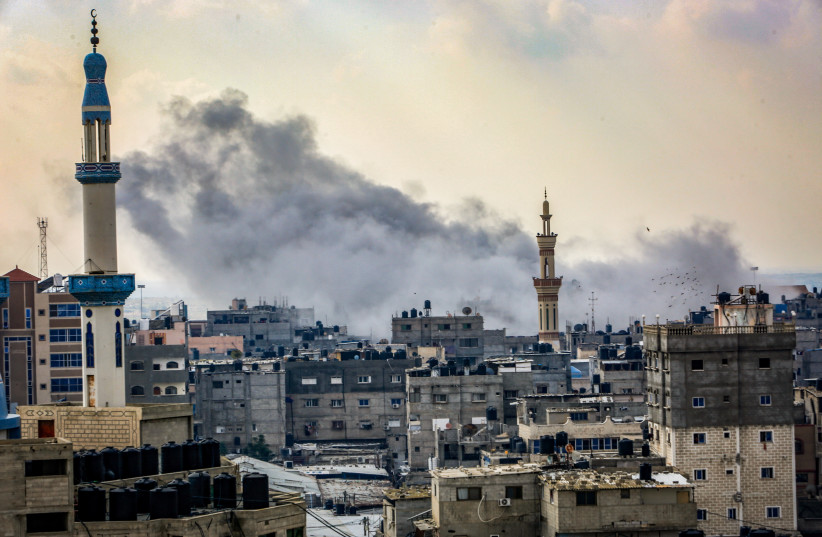Senator Chuck Schumer must have decided last week that he wants to see Benjamin Netanyahu remain Israel’s prime minister for years to come. Otherwise, it is hard to understand what the senior senator from New York thought he would achieve when calling for new leadership in Israel while drawing an equivalence between the country’s democratically-elected government, and the terrorist organization in Gaza that the IDF has been fighting for the last five months.
This has nothing to do with what someone’s opinion might be about the prime minister. There is legitimate criticism of Netanyahu and strong feelings that he should have stepped down years ago. There is no doubt that Netanyahu needs to be held personally responsible for the failures that led to this war, and it is even possible that had he done so, the October 7 massacre could have been avoided. He was the prime minister for the last 15 years (except for one) and he set the policy that allowed Hamas to grow in strength.
On the other hand, he is the democratically elected prime minister of this country and the way for him to be replaced is for the Israeli people to do so at the ballot. It is not the place of a US senator – no matter how senior and how pro-Israel he might be – to lobby for elections to replace him. It is also important to keep in mind that while polls show that a new election would replace Netanyahu, those same polls show that a majority of Israelis support his government’s war policies.
One poll from this week saw 82% of Israelis support Netanyahu’s call for an offensive against Hamas in the southern Gaza town of Rafah despite US opposition.
This is a case in which two things can be true – Israelis support the policies of the government at the same time that Israelis want new leadership. But again, this is something for the Israeli people to decide. It is not the place of a foreign government to tell us how we should vote and who should run our country.

THIS POLITICAL tension comes at a time when Israel’s war against Hamas appears to be stuck. While Israel has been warning for weeks of an imminent operation in Rafah – which is needed to further degrade Hamas capabilities and destroy smuggling tunnels from Egypt – the operation is mostly being used right now as a bargaining chip to pressure Hamas to finalize a deal that brings some of the hostages home.
It is mainly for this reason that Israel has yet to begin even the initial step of starting to move the displaced Gazans who are currently in the area of Rafah so they will not be caught in the crossfire if and when there is an IDF offensive in the southern Gaza town. That is the first step that will need to be taken before the first tank enters Rafah.
Israel is waiting for a deal
In the meantime, while Israel waits to see if there will be a deal, on the ground the operation seems to be on hold. There is still some fighting in the central Gaza Strip as well as sporadic clashes in northern Gaza where Hamas is trying to redeploy, but when it comes to expansion of the offensive, the IDF is waiting.
This same thinking applies to the operation that took place this week at Shifa Hospital where the IDF went in for what can best be described as “mowing the terror lawn” in Gaza.
As of Thursday, the operation has been considered a success – IDF elite troops fighting alongside forces from the Shin Bet (Israel Security Agency), surrounded the hospital, prevented terrorists from leaving, captured several hundred, and killed almost 100 more. It was the second operation that saw IDF soldiers enter Shifa, a place that before October 7 was described as a terrorist fortress that Israel would never be able to enter.
The operation this week needs to be looked at in the context of what Israel wants the day after the Gaza war to be like. It is an example of the type of operations Israel will need to continue carrying out in Gaza once the high-intensity stage of the war is completed. In other words, if a year from now, Israel again sees terrorists hiding inside Shifa, it will need to go in and round them up.
That is essentially what victory in this war will look like. It will not be a win by knockout as some people would like to see but it will be a process, one that takes time. Basically, this is not about the elimination of Hamas but about creating a new security reality in the Gaza Strip in which Israel can enter when it needs and wants and eliminates threats as they arise.
That is a worthy goal of this war. It would be similar to the result that came from Operation Defensive Shield that was launched in the West Bank 22 years ago this month and saw the IDF restore the operational freedom it had lost a few years earlier under the Oslo Accords. Just like the IDF enters the West Bank cities of Jenin, Tulkarm, and Nablus to surround a home and arrest a terrorist, it needs to be able to do this in Khan Yunis two years from now, five years from now, and 10 years as well.
This is what Shifa symbolizes; it shows how Israel’s operation in northern Gaza has already created new conditions and provided the military with the ability to enter a place that once was deemed inaccessible and too dangerous.
It is a path forward with a clear goal. The question is whether between Washington, Jerusalem, and Rafah getting there will even be possible.
The writer is a senior fellow at the Jewish People Policy Institute (JPPI) and a former editor-in-chief of The Jerusalem Post.
